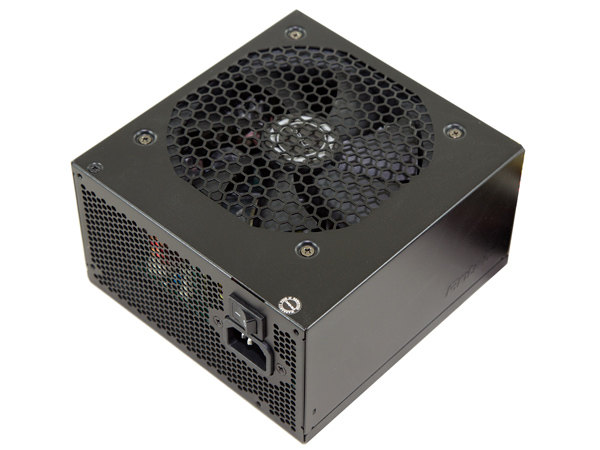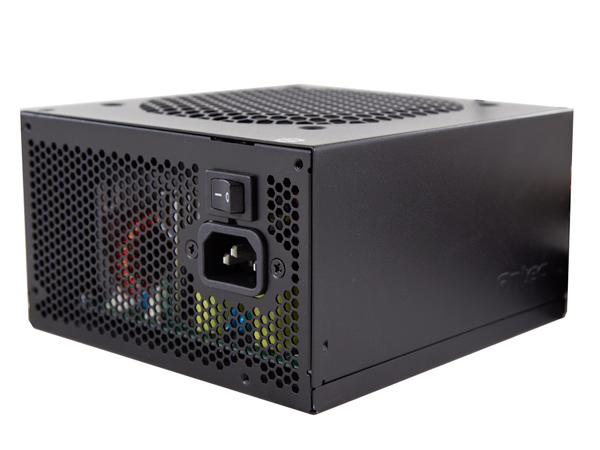Early Verdict
It is very difficult to find a PSU that uses only Japanese capacitors in this price range. The VPF650 — along with its U.S. version, the EA-650 PSU — offers good performance and, thanks to its decent price, achieves a high performance-per-dollar score.
Pros
- +
Affordable • Build quality • Compact dimensions • Four PCIe connectors • Full power at 46 C • Japanese capacitors • Load regulation at 3.3V • Low ripple • Performance in turn-on transient tests
Cons
- -
3.3V performance in Advanced Transient Response tests • Efficiency • Holdup time • Inrush current • Lacks an MOV in the EMI filter • Noisy
Why you can trust Tom's Hardware
Introduction
We first learned about the new VPF units with 80 PLUS Bronze efficiency and 350 to 650W capacities at this year's Computex. Antec's latest effort targets the average user who wants a budget-oriented PSU that's reliable and geared toward a mid-range system. Company representatives let us know they decided not to use the VPF nomenclature in the U.S. market. Instead, the VPF series is available under the EarthWatts Green name. According to Antec, the only difference between units sold in Europe and in the United States is the name on the boxes and labels. In Europe, the VPF supplies sell at an attractive price (around $57 for the VPF650); in the United States, the EarthWatts Green series goes for a bit more, with the EA-650 priced at $75.
Today we're evaluating the most powerful model in the VPF (EarthWatts Green) line with up to 650W output. To lower production costs, this unit doesn't utilize modular cabling, and only the main ATX cable is sleeved. The rest of the cables are left naked, which looks a little strange since even the most affordable PSUs—at least the branded ones—feature sleeving throughout. But this isn't a cheap supply; it's manufactured by Delta Electronics, which is the largest and one of the best PSU manufacturers around. Its implementations don't come cheap. Currently, Delta makes desktop PSUs exclusively for Antec. That’s probably because Delta no longer has an interest in this market, and only Antec managed to keep an active contract with the company.
The older VPF series carried a plain 80 PLUS certification, so the upgrade to Bronze makes a significant difference. In addition, the VPF650 can support up to two high-end graphics cards with its four PCIe connectors. Moreover, it is compatible with the sleep states that Intel's Haswell CPUs introduced (S6 and S7). That is, it can deliver full load on the minor rails (5V and 3.3V) without any problems while the +12V load is very low (Intel's test procedure demands only 0.1A).
Specifications
The official specifications list all available protection features, including over-temperature protection (OTP). The max temperature at which the PSU can deliver its full power continuously is 40 degrees Celsius, and although the ATX specification recommends 50 °C, 40 degrees is still high enough for a mainstream PSU. The cooling fan uses a sleeve bearing, which is expected in a budget PSU. As for the unit's dimensions, the VPF650 has restricted length, meaning it will fit in every ATX case. Finally, the warranty is set at three years.
Power Specifications
| Rail | 3.3V | 5V | 12V1 | 12V2 | 5VSB | -12V | |
|---|---|---|---|---|---|---|---|
| Max. Power | Amps | 20 | 20 | 35A | 35A | 3 | 0.5 |
| Watts | 120 | 648 | 15 | 6 | |||
| Total Max. Power (W) | 650 |
There are two +12V rails that can deliver the VPF650's full power. This means that the minor rails are regulated by DC-DC converters, and their maximum combined power is high enough for the needs of a contemporary PC that draws power mostly from the +12V rail.
Cables And Connectors
| Native Cables | ||
|---|---|---|
| Description | Cable Count | Connector Count (Total) |
| ATX connector 20+4 pin (510mm) | 1 | 1 |
| 4+4 pin EPS12V (560mm) | 1 | 1 |
| 6+2 pin PCIe (510mm+120mm) | 2 | 4 |
| SATA (470mm) / four-pin Molex (+120mm+120mm+120mm) / FDD (+120mm) | 1 | 1 / 3 / 1 |
| SATA (470mm+120mm+120mm+120mm) | 1 | 4 |
Although all cables except for the main ATX cable aren't sleeved, Antec still equips this budget PSU with enough connectors to easily deliver its full power, driving a system equipped with up to two powerful graphics cards. In addition, the SATA connectors are adequate for this capacity. We did find the mix of a single SATA, three four-pin Molex and a FDD connector installed on the same cable to be a bit weird, though. Looking at cable length, it would be better if the ATX cable were 55 centimeters long and the EPS connector were at least 60 cm away from the PSU. Since this PSU will most likely be installed in a medium-size case, however, the current cable length shouldn't cause any problems. Finally, all connectors consist of standard 18-gauge wire.
Power Distribution
| Power Distribution | |
|---|---|
| 12V1 | ATX, PCIe, Peripheral, SATA |
| 12V2 | EPS |
The single EPS connector is powered by a dedicated rail and it isn't mixed with the PCIe connectors. This is definitely the way to go. But we don't like the fact that the 12V1 is overloaded with connectors, while the 12V2 rail has only the single EPS to worry about. If it were up to us, we would power all PCIe connectors from 12V1 and all the rest from 12V2. This way, the load would be much more balanced.
Get Tom's Hardware's best news and in-depth reviews, straight to your inbox.
MORE: How We Test Power SuppliesMORE:
Who's Who In Power Supplies, 2014: Brands Vs. ManufacturersMORE:
All Power Supply ArticlesMORE:
Power Supplies in the Forums

Aris Mpitziopoulos is a contributing editor at Tom's Hardware, covering PSUs.
-
CTurbo I hope Delta is not going to get out of the consumer psu business completely. They've been one of my go-to oems for years. Top notch reliability.Reply -
Onus Antec has been one of my go-to standards for years as well. Though it has been surpassed in efficiency, I may need to put my SG-650 in my will because of its anticipated durability.Reply -
2Be_or_Not2Be When the author says "... Delta no longer has an interest in this market..." - what market is he talking about? I seem to recall that quite a few of my Dell servers had Delta OEM PSUs, and I think a number of Dell desktops had custom Delta PSUs as well. So is it only the consumer market that they don't want to supply anymore?Reply -
iam2thecrowe Reply16537381 said:When the author says "... Delta no longer has an interest in this market..." - what market is he talking about? I seem to recall that quite a few of my Dell servers had Delta OEM PSUs, and I think a number of Dell desktops had custom Delta PSUs as well. So is it only the consumer market that they don't want to supply anymore?
probably. There is now too much competition in the consumer psu market for it to be really profitable for some companies. It would make sense if a company only wanted to do anything other than generic PC ATX psu's, because they can charge a lot more for it. -
Aris_Mp Yeap Delta is away from consumer market. They mostly make OEM PSUs now. As far as I know only Antec has a contract with them for desktop PSUs.Reply

